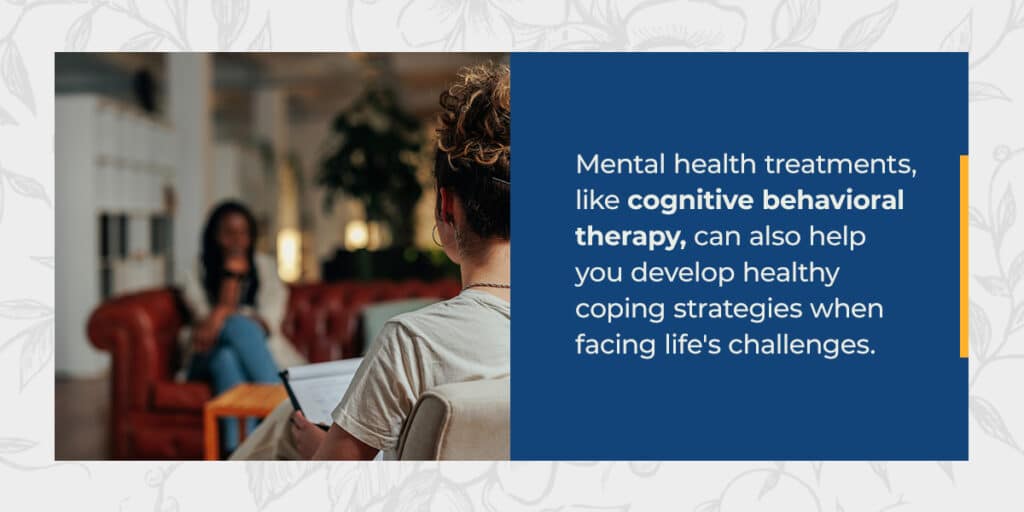

Substance use disorder (SUD) affects over 46 million Americans aged 12 and older. Addiction can be heartbreaking for anyone involved, but it’s possible to overcome. Part of recovery involves exploring and addressing the underlying cause of addiction. Let’s journey together to discover what causes addiction and how to overcome it.
Drug addiction is a chronic and complex brain disorder that causes compulsive drug use even when it causes harm. Substance use also affects a person’s judgment, memory and decision-making abilities.
Addiction is considered a brain disorder because it alters how the brain works. As a person develops an addiction, their brain learns to associate substances with pleasurable feelings, causing them to seek those feelings again by taking more of the substance. Eventually, the brain forms a habit around drug use which can be extremely difficult to break.
You may not understand why someone continues using drugs, but it’s important to remember that addiction is anything but simple. It changes a person’s brain, making it challenging for them to make healthy decisions.
Typically, a combination of factors contributes to a person developing an addiction. For instance, someone who’s learned to cope with difficult emotions by drinking may turn to alcohol when they feel stressed. Another person might use substances to escape the loss of a loved one.
Consider the causes of drug addiction below.
People recovering from an injury or surgery are often prescribed prescription medication to relieve physical pain. Addiction can result from taking painkillers — like prescription opioids — especially if a person has been dependent on medication for an extended period.
Others may rely on substances to relieve emotional pain like grief, loneliness or sadness. For example, people who’ve experienced loss or trauma might use substances to escape these painful experiences.
Additionally, people with substance use disorder may also have a co-occurring mental health disorder like depression or anxiety. Symptoms of these mental health conditions can trigger substance use, making it more difficult to break the addiction cycle. More than a quarter of adults with severe mental health issues also have a substance use disorder.
When an individual suddenly stops taking a drug, they might experience uncomfortable withdrawal symptoms, such as:
Symptoms vary depending on the type of drug and the amount used. The possibility of experiencing withdrawal symptoms can make it challenging for individuals to stop taking substances, but addiction treatment can help mitigate withdrawal symptoms.

Genetic factors may increase a person’s risk of developing an addiction. Genes could play a role in how a person’s brain regulates dopamine release, which is part of the brain’s reward system.
If addiction runs in your family, there are ways to reduce your risk. Stress reduction techniques — such as exercise — can help prevent addiction despite genetics. Mental health treatments, like cognitive behavioral therapy, can also help you develop healthy coping strategies when facing life’s challenges.
Environmental factors include the people or situations a person is exposed to. These factors can affect how someone views substances and whether they have easy access to them.
Someone whose family members misused substances is more likely to use drugs and is at a higher risk of addiction. Additionally, peers have a lot of influence over one another. Peer pressure at school can cause a student to experiment with drugs when they wouldn’t have otherwise.
Social determinants of health (SDoH) are the conditions in which people live and age. SDoH has a profound impact on addiction, as one study found that opioid overdoses across 17 states were concentrated in more economically disadvantaged zip codes. These zip codes are indicated by higher rates of unemployment and poverty and a lower median household income.
People who use drugs in their youth are more likely to develop a substance use disorder. Scientists believe this may be due to how substances impact the developing brain and other risk factors, like exposure to familial stress or abuse.
A crucial part of adolescent development involves learning strategies to handle stress. Young people who learn to reduce their stress by using drugs may develop addiction. Treatment and professional help can help these individuals unlearn maladaptive behaviors and provide healthy strategies for dealing with worry and stress.
Addiction is treatable. In fact, most people who struggle with addiction eventually recover. Everyone has different needs for recovery, so it’s essential to take an individualized approach.
Many people overcome addiction after receiving professional treatment. Addiction is a complex disease, and professional guidance is often necessary. A therapist or treatment center can help address the root cause of addiction and provide the necessary tools for a successful recovery.
Medication-assisted treatment (MAT) supported by counseling provides a whole-patient approach to recovery. MAT helps with withdrawal symptoms, while counseling sessions can help individuals address co-occurring mental health conditions and other concerns.
Individuals who would benefit from more intensive treatment can receive inpatient treatment, where they’ll stay at a residential treatment center and participate in daily group counseling as well as individual counseling sessions. After finishing a residential treatment program, continuing care programs can help individuals adjust back to their routines.
Others might be more suited to an outpatient treatment program — a part-time treatment program that allows individuals to maintain their daily lives.
Counselors and treatment professionals may also recommend supplementary strategies for people struggling with addiction. These strategies offer healthy coping mechanisms that people can use in their daily lives:
These strategies can help individuals find healthy coping strategies for dealing with negative emotions, helping them through the recovery journey.
Recovery is a journey, and we understand that taking the first step can be challenging. You don’t have to walk alone — we’re here to help.
Hope For Tomorrow offers individualized treatment programs to meet your specific needs and help you reach your goals. Our compassionate staff will help you feel at home and work hard to lift you up through the challenges of recovery.
If you or your loved one are ready to take that step, contact us today.